
Samuel Freiherr von Pufendorf was a German jurist, political philosopher, economist and historian. He was born Samuel Pufendorf and ennobled in 1694; he was made a baron by Charles XI of Sweden a few months before his death at age 62. Among his achievements are his commentaries and revisions of the natural law theories of Thomas Hobbes and Hugo Grotius.
Nikolaus Ager, name also spelled Nicolas Ager and sometimes referred to as Agerius was a French physician and botanist born in Alsace. He was the author of the treatise "De Anima Vegetativa" (1629).
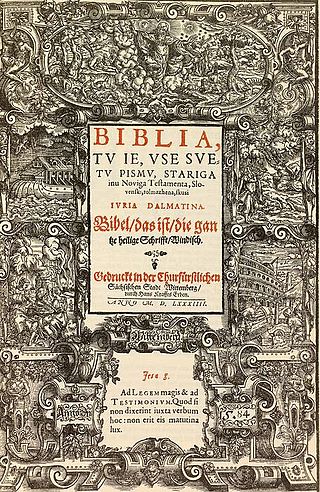
Jurij Dalmatin was a Slovene Lutheran minister, reformer, writer and translator. He translated the complete Bible into Slovene.
Theodorus Moretus, also known as Theodor or Theodore Moretus (1602–1667) was a Flemish Jesuit priest who was also a mathematician, geometer, theologian and philosopher. He spent most of his working life in Prague and Breslau where he taught philosophy, theology and mathematics. He published a number of treatises on these three subjects and also on physics and music theory.

Ferenc Dávid was a Protestant preacher and theologian from Transylvania, the founder of the Unitarian Church of Transylvania, and the leading figure of the Nontrinitarian Christian movements during the Protestant Reformation. He disputed the mainstream Christian doctrine of the Trinity, believing God to be one and indivisible.
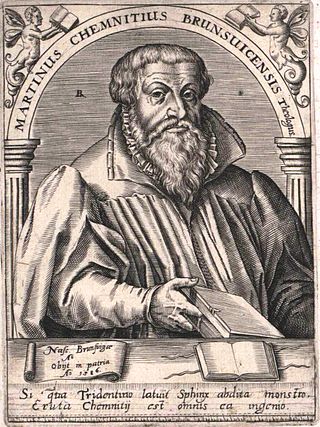
Martin Chemnitz was an eminent second-generation German, Evangelical Lutheran, Christian theologian, and a Protestant reformer, churchman, and confessor. In the Evangelical Lutheran tradition he is known as Alter Martinus, the "Second Martin": Si Martinus non fuisset, Martinus vix stetisset goes a common saying concerning him. He is listed and remembered in the Calendar of Saints and Commemorations in the Liturgical Church Year as a pastor and confessor by both the Evangelical Lutheran Church in America and Lutheran Church–Missouri Synod.

Augustinus seu doctrina Sancti Augustini de humanae naturae sanitate, aegritudine, medicina adversus Pelagianos et Massilianses, known by its short title Augustinus, is a theological work in Latin by Cornelius Jansen. Published posthumously in Louvain by Jacobus Zegers in 1640, it was in three parts:
- On Pelagianism
- On original sin
- On divine grace

Andreas Musculus was a German Lutheran theologian and Protestant reformer.

Marcin Wadowita also known as Wadovius or Campius, was a Polish priest, theologian, professor, and the Deputy Chancellor of Jagiellonian University in Kraków; under his tenure the university is said to have prospered.

Joachim Westphal was a German "Gnesio-Lutheran" theologian and Protestant reformer.

Gül Mosque is a former Byzantine church in Istanbul, Turkey, converted into a mosque by the Ottomans.
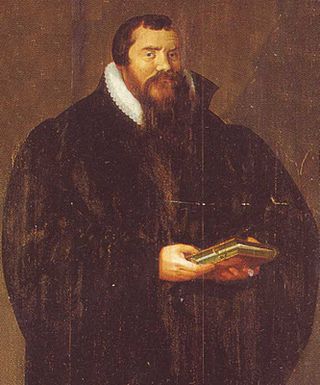
Aegidius Hunnius the Elder was a Lutheran theologian of the Lutheran scholastic tradition and father of Nicolaus Hunnius.
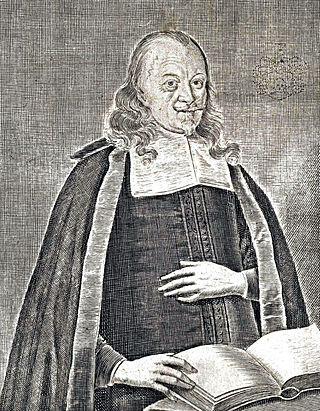
Johannes Musaeus was a German Protestant theologian.
Martinus Smiglecius was a Polish Jesuit philosopher and logician, known for his erudite scholastic Logica.
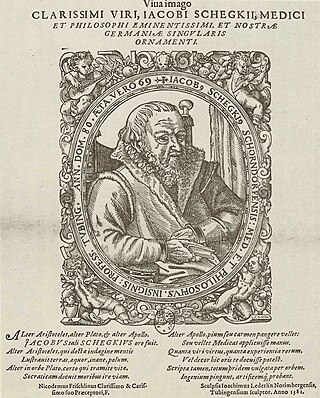
Jakob Schegk was a polymath German Aristotelian philosopher and academic physician.
Francesco Stancaro was an Italian Catholic priest, theologian, Protestant convert, and Protestant reformer who became professor of Hebrew at the University of Königsberg.
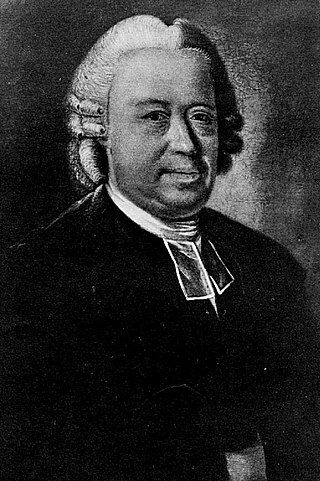
Christian Wilhelm Franz Walch was a protestant German theologian and professor of theology from Göttingen. He authored numerous books.
Magnus Agricola was a German Lutheran superintendent and theologian.
Dimitrije Ljubavić was a Serbian Orthodox deacon, humanist, writer and printer who together with German reformer Philip Melanchthon initiated the first formal contact between the Eastern Orthodox Church and the Lutherans in 1559 when Ljubavić took a copy of the Augsburg Confession to Patriarch Joasaph II of Constantinople. He is also referred to as Demetrios Mysos or Demetrius Mysos in Lutheran and other Western books.

Georg Heinrich Häberlin (1644–1699) was a Lutheran theologian of Germany.














